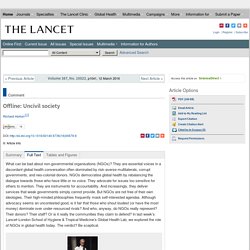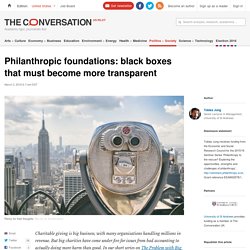

Civil society organisations and global health initiatives: Problems of legitimacy. Theconversation. When we hear phrases like vaccine objection, vaccine refusal and anti-vaxxers, it’s easy to assume these are new labels used in today’s childhood vaccination debates.

But there’s a long history of opposition to childhood vaccination, from when it was introduced in England in 1796 to protect against smallpox. And many of the themes played out more than 200 years ago still resonate today. For instance, whether childhood vaccination should be compulsory, or whether there should be penalties for not vaccinating, was debated then as it is now. Throughout the 19th century, anti-vaxxers widely opposed Britain’s compulsory vaccination laws, leading to their effective end in 1907, when it became much easier to be a conscientious objector. Today, the focus in Australia has turned to ‘no jab, no pay’ or ‘no jab, no play’, policies linking childhood vaccination to welfare payments or childcare attendance. India Is Winning Its War on Human Waste. Nearly three years ago, Indian Prime Minister Narendra Modi made one of the boldest comments on public health that I have ever heard from an elected official.

It's still having a big impact today. He made the comment during his first speech to the nation commemorating India's Independence Day. Modi said: “We are living in the 21st century. Has it ever pained us that our mothers and sisters have to defecate in the open?... The poor womenfolk of the village wait for the night; until darkness descends, they can`t go out to defecate. I can’t think of another time when a national leader has broached such a sensitive topic so frankly and so publicly. On my most recent visit to India, I made a short virtual-reality video about this amazing undertaking: VR on the Gates Notes 360 video is not currently supported in this browser.
NOTE: This is a virtual reality film that you can view using a VR headset, or in your browser as a 360° video. There are two keys to achieving the targets of Clean India. Poorest and most marginalised women continue to be most at risk of maternal death. New tactics to nudge habit change for open defecation behavior. Open defecation remains a critical global health challenge, affecting almost 1 billion people around the world and contributing significantly to the estimated 842,000 people who die each year because of poor sanitation, hygiene practices, and unsafe water supplies [1].

Most behavior change approaches and frameworks for addressing open defecation have focused on relatively conscious, “reflective” drivers of behavior, including people’s emotions (such as pride or shame), rational knowledge (e.g., of germ theory), social norms, and explicit action plans (such as commitments to change). Using the framework popularized by renowned social psychologist Daniel Kahneman [2], these factors can be described as “System 2” drivers of behavior i.e., relatively conscious and motivational factors. It is now well established, however, that human behavior can also be heavily influenced by “System 1” drivers i.e., relatively automatic, cue-driven factors [3]. Opinion: Uncivil society (Horton, 2016) What can be bad about non-governmental organisations (NGOs)?

They are essential voices in a discordant global health conversation often dominated by risk-averse multilaterals, corrupt governments, and neo-colonial donors. NGOs democratise global health by rebalancing the dialogue towards those who have little or no voice. They advocate for issues too sensitive for others to mention. They are instruments for accountability. Opinion: pros and cons of foundations. Charitable giving is big business, with many organisations handling millions in revenue.

But big charities have come under fire for issues from bad accounting to actually doing more harm than good. In our short series on The Problem with Big Charity, Tobias Jung looks at how foundations work – or not. A philanthropic foundation and an octopus have much in common. Their non-rigid forms mean that they are both flexible and able to squeeze into areas that are inaccessible to others. Opinion: Bill Gates foundation spends bulk of agriculture grants in rich countries. Most of the $3bn (£1.8bn) that the Bill & Melinda Gates Foundation has given to benefit hungry people in the world’s poorest countries has been spent in the US, Britain and other rich countries, with only around 10% spent in Africa, new research suggests.

Analysis of grants made by the foundation shows that nearly half the money awarded over the past decade went to global agriculture research networks, as well as organisations including the World Bank and UN agencies, and groups that work in Africa to promote hi-tech farming. The other $1.5bn went to hundreds of research and development organisations across the world, according to Grain, a research group based in Barcelona. “Here, over 80% of the grants were given to organisations in the US and Europe, and only 10% to groups in Africa. By far the main recipient country is the US, followed by the UK, Germany and the Netherlands,” it says in a report published on Tuesday. The centres have received more than $720m from Gates since 2003.